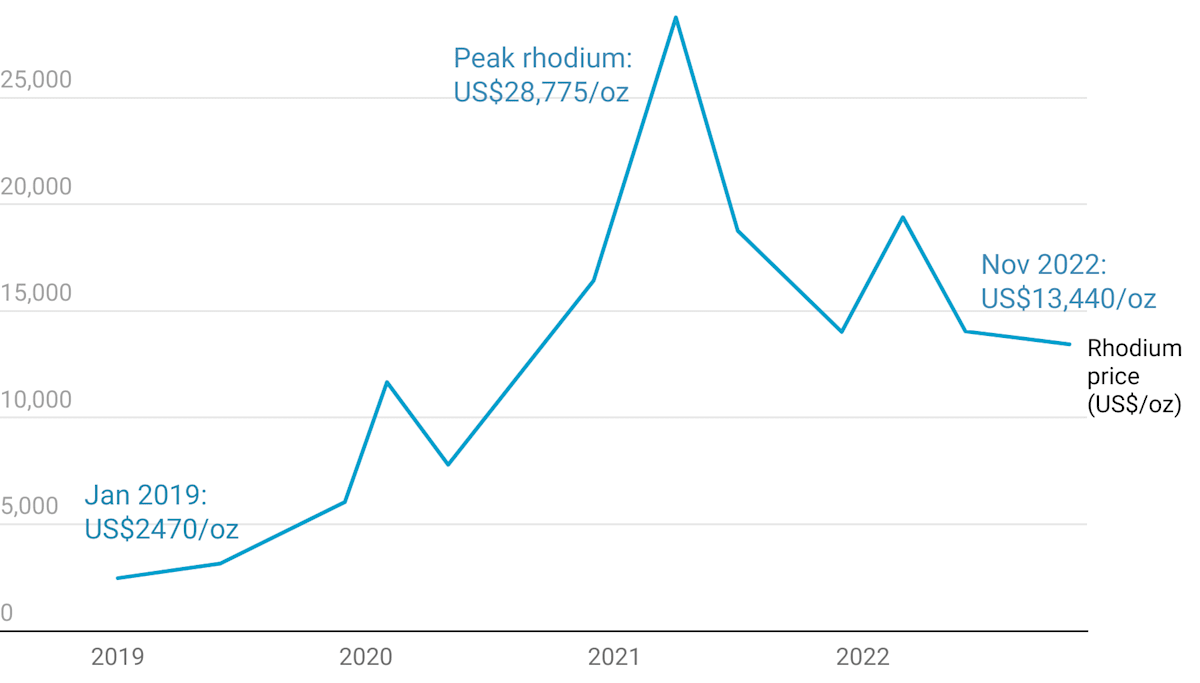
A huge spike in the price of a little-known precious metal has seen thieves crawling under cars to steal a critical part of their exhaust systems
Last month US authorities busted what they called a nationwide criminal gang, charging 21 people with theft and money-laundering crimes, and seizing millions of dollars of assets.
The merchandise of choice for the criminal ring wasn’t drugs or jewellry, electronics or e-bikes. It was catalytic converters - those dirty-looking cylindrical gadgets that attach to your car’s exhaust system and turn noxious gases into less noxious ones.
And one of the main reason thieves - in New Zealand as well as other parts of the world - have taken to stealing catalytic converters over the past couple of years, is an unassuming silvery-grey powder called rhodium.
Rhodium is particularly good at turning the nitrogen oxides and carbon monoxide produced by car engines into something less poisonous - to humans at least.
Coated on the inside of the metal cylindrical casing of the converter, alongside ‘cheaper’ precious metals like platinum and palladium, rhodium acts as a catalyst to speed up the chemical reactions between oxygen and pollutants in the air, to convert them into less toxic by-products like water vapor, carbon dioxide, and nitrogen gas.
READ MORE: * The pain of charging your EV on the go * 'Significant' emissions from fuel tax cut Which is why it’s much in demand. The supply is a problem, however.
Rhodium is a by-product of other mining operations, so its supply is inelastic, and almost all of it is produced in South Africa and to a lesser extent Russia.
This means the metal has always been expensive. For decades it hovered somewhere below US$1000 an ounce - more expensive than gold or platinum - sometimes spiking above US$2000 or even US$4000.

Then in late 2020 and 2021, as the graph shows, the price went ballistic, rising to US$16,000 in December 2020 and $28,700 in April 2021. Chinese demand for cars and stricter emissions standards were exacerbated by supply shortages, particularly when South Africa’s strict Covid restrictions shut down mines or cut production.
The rhodium price has since dropped back, although it spiked again in March this year. It was $13,400 in November.
In New Zealand, catalytic converters have been mandated by law on cars since 2010. One catalytic converter contains 1-2 grams of rhodium; vehicles with more grunty engines tend to have more rhodium than lower spec ones.
As the price of rhodium soared in 2020 and 2021, suddenly that 1-2 grams of precious metal started to be worth crawling under a car for, particularly since there’s the added bonus of platinum and palladium in there too.
Newsroom’s calculation suggests even at US$13,400 an ounce, a catalytic converter might have NZ$800 worth of rhodium inside; at US$28,000 it could be nearer NZ$1600, though you’ve got the cost of recycling to factor in.
A Guardian article about the US catalytic converter criminal gang says catalytic converters “can fetch more than US$1,000 on the black market”.
Meanwhile, getting them off a car can be a matter of less than five minutes’ work if you know what you are doing, and the ‘cats’ often don’t have any identification details on them, making them hard for police to track. Police in some parts of the US have started a campaign to etch vehicles' licence plate numbers on their catalytic converters.
New Zealand isn’t immune to catalytic converters being stolen from cars. Police report thefts in Auckland and Canterbury from car yards and private owners both last year and in 2022. Replacing a stolen converter can cost anything from $1500 to more than $3000, depending on the type of vehicle.
People should be on their guard, a NZ Police spokesperson told Newsroom.
“The best prevention is high definition CCTV cameras and high quality security lighting at commercial premises and ensuring private vehicles are parked securely, preferably in a garage or with a vehicle alarm installed. The public are requested to call police if they notice any unusual behaviour, including people crawling under cars late at night.”
Members of the NZ Association of Metal Recyclers were working with police to try to prevent metal theft, the spokesperson said.
Meanwhile, a metals recycler told Newsroom rhodium prices could go up again next year, as supply chain shortages in the car manufacturing industry eased and production increased.
The market for catalytic converter scrap had eased over the past two-three weeks, he said, as car wreckers and others held onto their ‘cats’ in anticipation of potentially higher precious metals prices in 2023.







